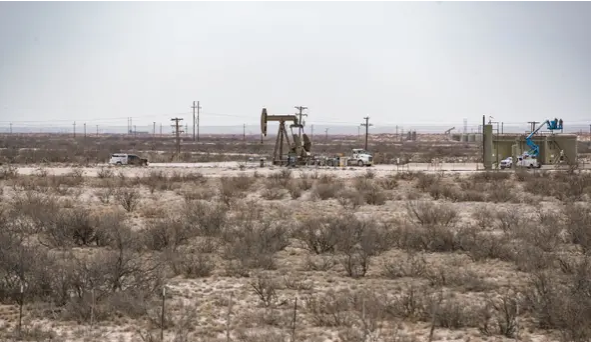
Florida based, privately owned Holtec International’s efforts to construct a Interim Nuclear Storage Facility (HI-STORE CISF) on a 1000-acre site owned by the Eddy-Lea Energy Alliance (ELEA) continues to face legal challenges. The land proposed to store the spent nuclear waste is a former cattle grazing tract dotted with oil rigs located close to the border of Lea and Eddy counties.
A panel of three District of Columbia U.S. Court of Appeals judges heard arguments from attorneys representing environmental opponents of the project – Beyond Nuclear and the Sierra Club – on Tuesday, March 5.
Attorneys representing the environmentalists asked judges to allow the formal contentions about the project that their clients previously filed to be entered into the federal record. The contentions of the environmentalists were denied entry into the federal record by the United States Nuclear Regulatory Commission (NRC) on the grounds that they “…were not relevant to the proceedings and did not present any new information at the time of licensing,” states an article posted at CurrentArgus.com.
Both Beyond Nuclear and the Sierra Club ultimately seek to have the 40-year license granted to Holtec last year by the NRC revoked. The license allows Holtec to build its underground nuclear waste facility on the tract owned by the ELEA. The tract is close to both Hobbs and Carlsbad.
During their arguments to the appeals court, petitioners actually went further than to simply contend that Holtec’s license is invalid. They argued that the license is in actuality “Illegal” because “…it would allow the U.S. Department of Energy (DOE) to be a Holtec client that deposits nuclear waste in the underground site,” states Scott Wyland in a Santa Fe New Mexican article.
Attorneys for Beyond Nuclear and the Sierra Club argued that the law allows the DOE to only assume ownership of “high-level radioactive waste” produced by nuclear power plants if a permanent disposal location exists or else a site defined as “interim” could by default become “permanent”. Holtec International has never contended its proposed HI-STORE CISF would be anything but “temporary”, even in light of the fact that the license granted to the company by the NRC is for 40 years.
Refuting petitioners’ argument that the license Holtec has received is invalid, attorneys representing the company stated that the license gives Holtec the future latitude to accept waste from commercial utilities, as well as from the DOE. While agreeing that federal law precludes the DOE from assuming title to spent nuclear waste without a permanent storage site, Holtec’s attorney Paul Clement referred to petitioners’ argument as “extremist”/”absolutist”. Clement said, “It’s the same darned waste at the end of the day.” Clement also said that Congress has the power to change the law to allow the DOE “… to store and dispose of the waste rather than subsidizing storage costs, as it’s now doing.”
Beyond Nuclear attorney Diane Curran disagreed with Clement’s reasoning. Curran said that although the waste is the same, the entity that pays the costs of its storage and disposal is not the same. She reasoned that if owned by the government the costs of the storage and disposal of the waste become the burden of the public and no longer the responsibility of the private sector.
Currently, a centralized location to store spent nuclear waste in the United States does not exist. Instead, according to DOE data, the “cast-off solid fuel” – approximately 90,000 metric tons – is stored at 70 different sites in 36 states. The DOE website states that these temporary sites provide “safe storage” until a permanent site to ultimately consolidate the waste becomes a reality.
Wyland puts it this way in his Santa Fe New Mexican article. “Critics contend the 40-year license is further proof New Mexico is being set up as a de facto permanent dump site, given no other prospects have emerged since Yucca Mountain was derailed two decades ago.” He continues, “No one wants such a facility in their backyard, except the rural communities where the site is proposed, due to the jobs it would create.” Does Wyland’s opinion parallel the thoughts of those government officials from Lea and Eddy counties who wholeheartedly support the project?
As of this writing federal appeals court judges have not issued a verdict regarding the Holtec project appeal. It should be noted that a federal court in 2023 vacated a license granted to Interim Storage Partners by the NRC to store spent nuclear fuel at an Andrews, Texas site along the southeastern border of New Mexico. The court found that the “…NRC lacked the authority to grant approval after those opposed to the project sued for a review of the license in federal court,” states an article posted at CutrentArgus.com.


